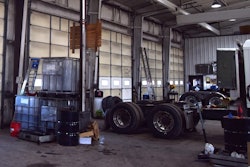An ongoing pandemic, a raging foreign war, and diesel prices on a high-flying rollercoaster ride marked the year 2022, sure to go down as one of the most volatile in trucking's recent history. At the year's end, Overdrive looks back at some of the biggest stories around trucking with this trip down memory lane.
Remembering early January 2022, we all seemed so innocent, didn't we? The difficulty heated up -- or cooled down in this case -- quickly, with Virginia's outgoing governor blaming drivers themselves for getting stuck in a 27-hour snow-in on I-95. While the incident was isolated, it set the tone for a year where weather loomed dangerous and government struggled to empathize with the trucking public, in more ways than one.
In February, news emerged around the Environmental Protection Agency's work on a new slate of regs for its "Cleaner Trucks Initiative," which would percolate behind closed doors until just a week ago, when the agency dropped the stringent new rules on equipment manufacturers, to much of the trucking world's worry about feasibility and equipment-cost implications.
Soon after, the state of California signaled intention to stick with its timeline for the ban on all pre-2010 spec engines in the state at the end of the year. Overdrive analyzed just what that might mean for the approximately 76,000 trucks then currently operating that could fall under the ban in the country's biggest economic powerhouse among states.
By late Spring, we were starting to see the first trickles of what ended up becoming a tide of owner-operators prodding at regs with exemption requests when an individual owner-operator, Lee Schmitt, asked the Federal Motor Carrier Safety Administration for an exemption from five provisions of the hours of service regulations. Namely, Schmitt was looking for an exemption from the 10 consecutive hour off-duty time requirement; the 14-hour driving window; the 30-minute break requirement; and the 60 hours in 7 days and the 70 hours in 8 days limits. Schmitt aimed to remain compliant with the daily 11-hour drive time limit and cited his natural sleep patterns and long, distinguished driving career as reasons why he should be exempt. Many in the trucking community supported the idea for a maximum of driving/duty flexibility with demonstrated experience, but Schmitt was ultimately denied though no less determined to try again.
Later, other owner-ops would wage similar campaigns with the FMCSA, gaining no shortage of support from fellow operators in the process, though none have yet succeeded.










